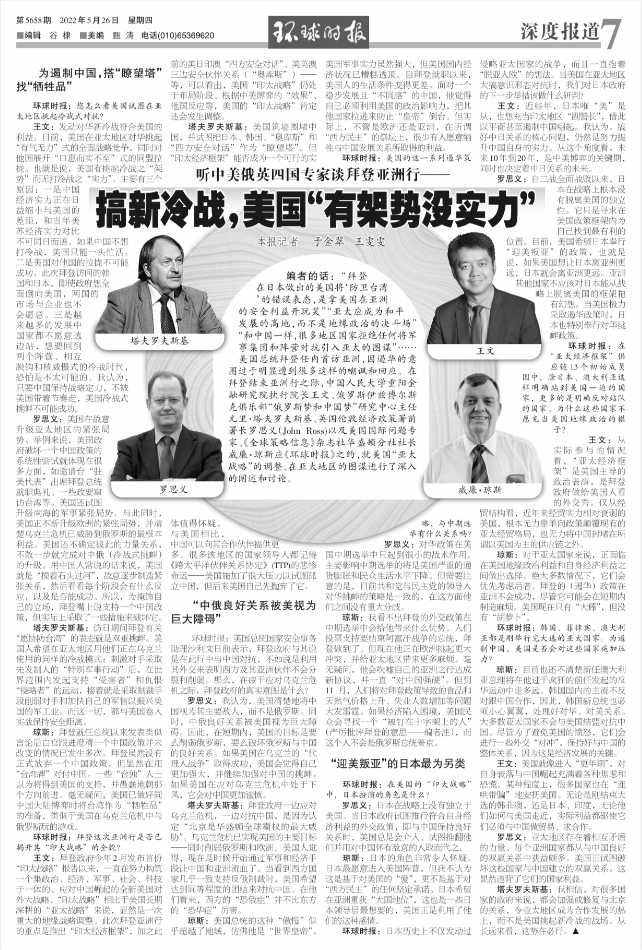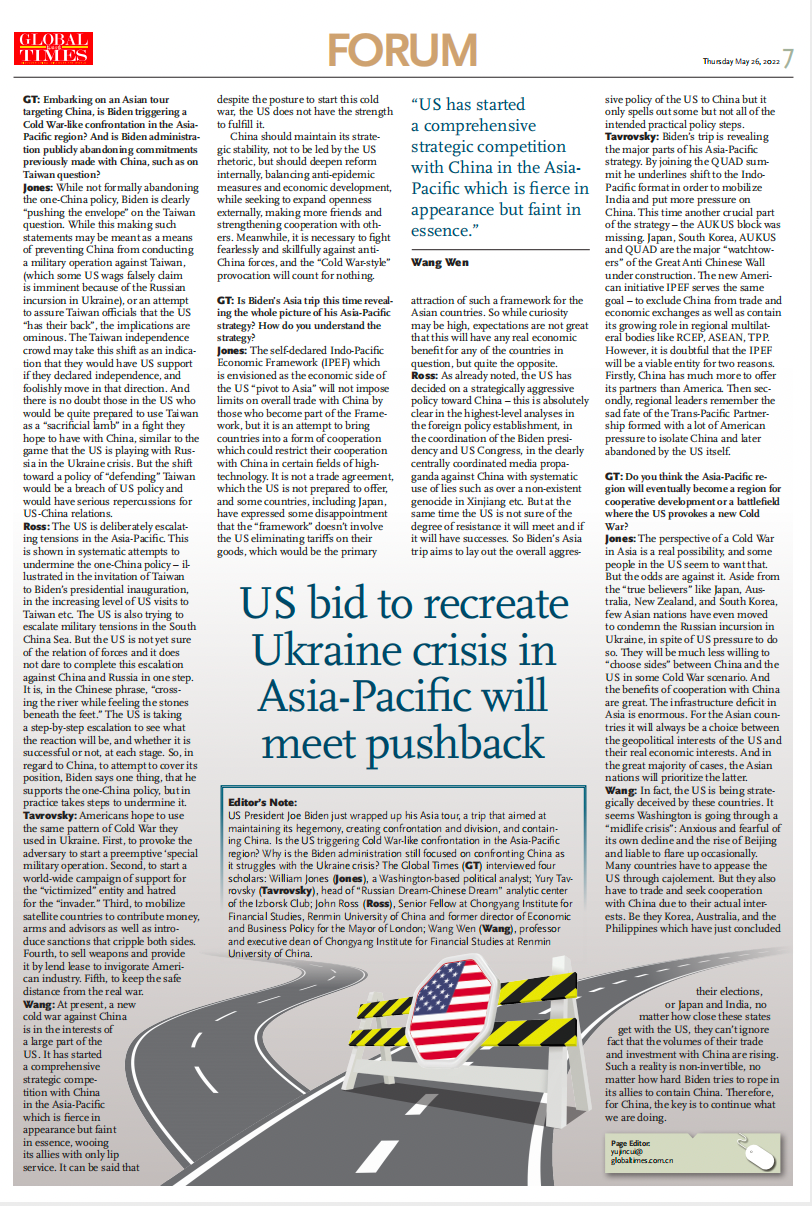发布时间:2022-05-26 作者: 人大重阳
在拜登结束亚洲行之际,中国人民大学重阳金融研究院执行院长王文、俄罗斯伊兹博尔斯克俱乐部“俄罗斯梦和中国梦”研究中心主任尤里·塔夫罗夫斯基、英国伦敦经济政策署前署长罗思义(John Ross)以及美国国际问题专家、《全球策略信息》杂志社华盛顿分社社长威廉·琼斯应《环球时报》之约,就美国“印太战略”的调整、在亚太地区的图谋进行了深入的阐述和讨论。
编者按:在美国总统拜登任内首访亚洲行结束之际,中国人民大学重阳金融研究院执行院长王文、俄罗斯伊兹博尔斯克俱乐部“俄罗斯梦和中国梦”研究中心主任尤里·塔夫罗夫斯基、英国伦敦经济政策署前署长罗思义(John Ross)以及美国国际问题专家、《全球策略信息》杂志社华盛顿分社社长威廉·琼斯应《环球时报》之约,就美国“印太战略”的调整、在亚太地区的图谋进行了深入的阐述和讨论。本文于5月26日在环球时报中、英文版两个整版刊发。
|核心提要|
■ 王文:
➢美国有挑起冷战之“架势”而无打冷战之“实力”。
➢搞好中日关系的核心问题,仍然是努力提升中国自身的实力。
➢“印太经济框架”是美国主导的政治表演,是拜登政府做给美国人看的“外交秀”。
➢美国就像进入“更年期”,对自身衰落与中国崛起充满着各种焦虑和恐慌。某种程度上,很多国家也在“连哄带骗”地安抚美国。
■ 尤里·塔夫罗夫斯基:
➢访日期间拜登有关“愿协防台湾”的表态就是双重挑衅。
➢对很多国家的政府来说,都会加强或修复与北京的关系,令亚太地区成为合作发展的热土,而不是美国挑起新冷战的战场。
■ 罗思义:
➢美国就是“摸着石头过河”,故意逐步制造紧张关系,然后看看每个阶段会有什么反应,以及是否能成功。
➢每个亚洲国家都从与中国良好的双赢关系中获益颇多。
■ 威廉·琼斯:
➢美国军事实力虽然强大,但美国国内经济状况已糟糕透顶。
➢日本希望在亚洲重获“大国地位”,这也是一些日本领导层最想要的,美国正是利用了他们的这种感情。

本文刊于5月26日环球时报整版截图
为遏制中国,搭“瞭望塔”找“牺牲品”
环球时报:您怎么看美国试图在亚太地区挑起冷战式对抗?
王文:发动对华新冷战符合美国的利益。目前,美国在亚太地区对华挑起“有气无力”式的全面战略竞争,同时对他国展开“口惠而实不至”式的同盟拉拢。也就是说,美国有挑起冷战之“架势”而无打冷战之“实力”。主要有三个原因:一是中国正在日益缩小与美国在经济实力方面的差距,这和当年美苏经济实力的对比情况有所不同。如果中国不想打冷战,美国只能一头忙活。二是美国对他国的拉拢不可能成功。此次拜登访问的韩国和日本,即使政府想全面倒向美国,两国的市场与企业也不会愿意。三是越来越多的发展中国家都不愿意选边站,想要回到两个阵营、相互脱钩和核威慑式的冷战时代,恐怕是不太可能的。我认为,只要中国保持战略定力,不被美国带着节奏走,美国冷战式挑衅不可能成功。
罗思义:美国在故意升级亚太地区的紧张局势。举例来说,美国政府破坏一个中国政策的系统性尝试就体现在很多方面,如邀请台“驻美代表”出席拜登总统就职典礼、一些政要窜访台湾等。美国还试图升级南海的军事紧张局势。与此同时,美国正不断升级欧洲的紧张局势,并清楚乌克兰危机已威胁到俄罗斯的最根本利益。美国还不确定彼此的力量关系,不敢一步就完成对中俄(冷战式挑衅)的升级。用中国人常说的话来说,美国就是“摸着石头过河”,故意逐步制造紧张关系,然后看看每个阶段会有什么反应,以及是否能成功。所以,为掩饰自己的立场,拜登嘴上说支持一个中国政策,但实际上采取了一些措施来破坏它。
塔夫罗夫斯基:访日期间拜登有关“愿协防台湾”的表态就是双重挑衅。美国人希望在亚太地区用他们正在乌克兰使用的同样的冷战模式:刺激对手采取先发制人的“特别军事行动”后,在世界范围内发起支持“受害者”和仇恨“侵略者”的运动,接着就是采取制裁手段削弱对手和加快自己的军售以振兴美国的军工业。而这一切,都与美国卷入实战保持安全距离。

俄罗斯伊兹博尔斯克俱乐部“俄罗斯梦和中国梦”研究中心主任尤里·塔夫罗夫斯基
琼斯:拜登就任总统以来发表类似言论后,白宫跟进澄清一个中国政策并未改变的情况已发生多次。拜登虽然没有正式放弃一个中国政策,但显然在为台海局势紧张推波助澜。一些“台独”人士以为将得到美国的支持,并愚蠢地朝那个方向前进。毫无疑问,美国已做好同中国大陆博弈时将台湾作为“牺牲品”的准备,类似于美国在乌克兰危机中与俄罗斯玩的游戏。
环球时报:拜登这次亚洲行是否已揭开其“印太战略”的全貌?
王文:拜登政府今年2月发布首份“印太战略”报告以来,一直在努力构筑一个集政治、经济、军事、社会、科技于一体的、应对中国崛起的全新美国对外大战略。“印太战略”相比于美国长期深耕的“亚太战略”来说,显然是一次重大的地缘战略调整。此次拜登亚洲行的重点是推出“印太经济框架”,加之此前的美日印澳“四方安全对话”、美英澳三边安全伙伴关系(“奥库斯”)——等,可以看出,美国“印太战略”仍处于布局阶段。根据中美博弈的“效果”、他国反应等,美国的“印太战略”肯定还会发生调整。

中国人民大学重阳金融研究院执行院长王文
塔夫罗夫斯基:美国筑墙围堵中国,并试图把日本、韩国、“奥库斯”和“四方安全对话”作为“瞭望塔”。但“印太经济框架”能否成为一个可行的实体值得怀疑。与美国相比,中国可以向其合作伙伴提供更多。很多该地区的国家领导人都记得《跨太平洋伙伴关系协定》(TTP)的悲惨命运——美国施加了很大压力以试图孤立中国,但后来美国自己先抛弃了它。
“中俄良好关系被美视为巨大障碍”
环球时报:美国总统国家安全事务助理沙利文日前表示,拜登政府与其说是在此行中与中国对抗,不如说是利用其外交来表明西方及其亚洲伙伴不会分裂和削弱。那么,在疲于应对乌克兰危机之际,拜登政府的真实意图是什么?
罗思义:我认为,美国清楚地将中国视为其主要敌人,而不是俄罗斯。同时,中俄良好关系被美国视为巨大障碍。因此,在短期内,美国的目标是要么削弱俄罗斯,要么破坏俄罗斯与中国的良好关系。如果美国在乌克兰的“代理人战争”取得成功,美国会觉得自己更加强大,并继续加强对中国的挑衅。如果美国在应对乌克兰危机中处于下风,它会对中国更加谨慎。
塔夫罗夫斯基:拜登政府一边应对乌克兰危机,一边对抗中国,是因为认定“北京是华盛顿全球霸权的最大威胁”。乌克兰危机已实现美国的主要目标——同时削弱俄罗斯和欧洲。美国人觉得,现在是时候开始通过军事和经济手段让中国和亚洲流血了。当看到西方国家几乎一致支持对俄制裁时,美国希望达到同等程度的团结来对抗中国。在他们看来,西方的“恐俄症”并不比东方的“恐华症”厉害。
琼斯:美国总统的这种“傲慢”似乎超越了地域,仿佛他是“世界皇帝”。美国军事实力虽然强大,但美国国内经济状况已糟糕透顶。自拜登就职以来,美国人的生活条件变得更差。面对一个稳步发展且“不同路”的中国,他觉得自己必须利用美国的政治影响力,把其他国家拉进来防止“皇帝”倒台。但实际上,不管是欧洲还是亚洲,在所谓“西方民主”的祭坛上,很少有国家愿意牺牲与中国发展关系所取得的利益。
环球时报:美国的这一系列遏华策略,与中期选举有什么关系吗?
罗思义:对华政策在美国中期选举中只起到很小的战术作用。主要影响中期选举的将是美国严重的通货膨胀和民众生活水平下降。但需要注意的是,目前共和党与民主党的领导人对华挑衅的策略是一致的,在这方面他们之间没有重大分歧。

英国伦敦经济政策署前署长罗思义
琼斯:我看不出拜登的外交政策在中期选举中会给他带来什么优势。人们投票支持要结束阿富汗战争的总统,拜登做到了。但现在他正在欧洲挑起更大冲突,并给亚太地区带来更多麻烦。毫无疑问,他会吹嘘自己的亚洲之行达成的新协议,并一直“对中国强硬”。但到 11 月,人们将对拜登政策导致的食品和天然气价格上升、失业人数增加等问题大发雷霆。如果经济陷入困境,美国民众会寻找一个“被钉在十字架上的人”(严厉批评拜登的意思——编者注),而这个人不会是俄罗斯总统普京。
“迎美叛亚”的日本最为另类
环球时报:在美国的“印太战略”中,日本扮演的角色是什么?
罗思义:日本在战略上没有独立于美国。当日本政府试图推行符合自身经济利益的外交政策,即与中国保持良好关系时,美国总是会介入、试图推翻他们并用对中国怀有敌意的人取而代之。
琼斯:日本的角色非常令人怀疑。日本最愿意进入美国阵营,但我不认为这是基于对美国的“爱”,更不是基于对“西方民主”的任何坚定承诺。日本希望在亚洲重获“大国地位”,这也是一些日本领导层最想要的,美国正是利用了他们的这种感情。

美国国际问题专家、《全球策略信息》杂志社华盛顿分社社长威廉·琼斯
环球时报:日本历史上不仅发动过侵略亚太国家的战争,而且一直抱着“脱亚入欧”的想法。当美国在亚太地区大搞意识形态对抗时,我们对日本政府的下一步举措该做什么研判?
王文:近些年,日本唯“美”是从,也想充当印太地区“副警长”,借此遏制中国崛起。我认为,搞好中日关系的核心问题,仍然是努力提升中国自身的实力。从这个角度看,未来10年到20年,是中美博弈的关键期,同时也决定着中日关系的未来。
罗思义:自二战全面战败以来,日本在战略上根本没有脱离美国的独立性。它只是寻求在美国政策框架内为自己找到最有利的位置。目前,美国希望日本奉行“迎美叛亚”的政策,也就是说,如果美国想让日本离亚洲更远,日本就会离亚洲更远。亚洲其他国家不应该对日本能从战略上脱离美国的框架抱有幻想。当美国极力采取遏华政策时,日本也特别奉行对华挑衅政策。
环球时报:在“印太经济框架”13个初始成员国中,除日本、澳大利亚这样明确站到美国一边的国家,更多的是明确反对选边站队的国家。为什么这些国家不愿充当美国地缘政治的棋子?
王文:从实际参与的情况看,“印太经济框架”是美国主导的政治表演,是拜登政府做给美国人看的“外交秀”。仅从经贸结构看,近年来经贸实力相对衰弱的美国,根本无力靠单向政策颠覆现有的亚太经贸格局,也无力将中国封堵在所谓以美国为主的供应链之外。
琼斯:对于亚太国家来说,都面临在美国地缘政治利益和自身经济利益之间做出选择。绝大多数情况下,它们会优先考虑后者。拜登的(遏华)政策在亚洲不会成功,尽管它可能会在短期内制造麻烦。美国现在只有“大棒”,但没有“胡萝卜”。
环球时报:韩国、菲律宾、澳大利亚都是刚举行完大选的亚太国家。为遏制中国,美国是否会对这些国家施加压力?
琼斯:目前还不清楚新任澳大利亚总理将在他过于疯狂的前任发起的反华运动中走多远。韩国国内的主流不反对跟中国合作,因此,韩国新总统也必须小心翼翼,处理好对华、对美关系。大多数亚太国家不会与美国结盟对抗中国。尽管为了避免美国的愤怒,它们会进行一些外交“对冲”,保持好与中国的整体关系,因为这是经济发展的关键。
王文:美国就像进入“更年期”,对自身衰落与中国崛起充满着各种焦虑和恐慌。某种程度上,很多国家也在“连哄带骗”地安抚美国。无论是刚结束大选的韩菲澳,还是日本、印度,无论它们如何与美国走近,实际利益都驱使它们必须与中国做贸易、求合作。
罗思义:亚太地区存在着相互矛盾的力量。每个亚洲国家都从与中国良好的双赢关系中获益颇多。美国正试图破坏这些国家与中国建立的双赢关系,这显然违背了它们的国家利益。
塔夫罗夫斯基:我相信,对很多国家的政府来说,都会加强或修复与北京的关系,令亚太地区成为合作发展的热土,而不是美国挑起新冷战的战场。从长远来看,这势在必行。
以下为英文版:
US bid to recreate Ukraine crisis in Asia-Pacific will meet pushback

Editor's Note:
US President Joe Biden just wrapped up his Asia tour, a trip that aimed at maintaining its hegemony, creating confrontation and division, and containing China. Is the US triggering Cold War-like confrontation in the Asia-Pacific region? Why is the Biden administration still focused on confronting China as it struggles with the Ukraine crisis? The Global Times interviewed four scholars: William Jones, a Washington-based political analyst; Yury Tavrovsky, head of "Russian Dream-Chinese Dream" analytic center of the Izborsk Club; John Ross, Senior Fellow at Chongyang Institute for Financial Studies, Renmin University of China and former director of Economic and Business Policy for the Mayor of London; Wang Wen, professor and executive dean of Chongyang Institute for Financial Studies at Renmin University of China.
GT:Embarking on an Asian tour targeting China, is Biden triggering a Cold War-like confrontation in the Asia-Pacific region? And is Biden administration publicly abandoning commitments previously made with China, such as on Taiwan question?
Jones: While not formally abandoning the one-China policy, Biden is clearly "pushing the envelope" on the Taiwan question. While the Taiwan Relations Act does state that the US is committed to maintaining the ability of Taiwan to defend itself against a possible attack, it clearly gives no indication that the US has the duty or intention to come to the aid of Taiwan, if it were be attacked. And yet Biden has stated something to that effect several times since becoming president, also with a White House "follow-up" to clarify that the one-China policy has not changed. More unsettling, since President Biden is prone to go "off script" in his statements, recent changes to the State Department "fact sheet" on Taiwan, which took out the important statements from previous editions, namely that the US does not support Taiwan independence and that the US considers Taiwan a part of China, seem to point in the direction of retrogression from the Three Joint Communiques, which the US agreed to in establishing relations with the PRC.
While this making such statements may be meant as a means of preventing China from conducting a military operation against Taiwan, (which some US wags falsely claim is imminent because of the Russian incursion in Ukraine), or an attempt to assure Taiwan officials that the US "has their back", the implications are ominous. The Taiwan independence crowd may take this shift as an indication that they would have US support if they declared independence, and foolishly move in that direction. And there is no doubt those in the US who would be quite prepared to use Taiwan as a "sacrificial lamb" in a fight they hope to have with China, similar to the game that the US is playing with Russia in the Ukraine crisis. But the shift toward a policy of "defending" Taiwan would be a breach of US policy and would have serious repercussions for US-China relations.
Ross: The US is deliberately escalating tensions in the Asia-Pacific. This is shown in systematic attempts to undermine the one-China policy - illustrated in the invitation of Taiwan to Biden's presidential inauguration, in the increasing level of US visits to Taiwan etc. The US is also trying to escalate military tensions in the South China Sea.
This is in parallel with escalating US policy in Europe, where it knew that attempts to incorporate Ukraine into NATO threatened Russia's most essential interests.
But the US is not yet sure of the relation of forces and it does not dare to complete this escalation against China and Russia in one step. It is, in the Chinese phrase, "crossing the river while feeling the stones beneath the feet." The US is taking a step-by-step escalation to see what the reaction will be, and whether it is successful or not, at each stage. So, in regard to China, to attempt to cover its position, Biden says one thing, that he supports the one-China policy, but in practice takes steps to undermine it.
Tavrovsky: Americans hope to use the same pattern of Cold War they used in Ukraine. First, to provoke the adversary to start a preemptive 'special military operation. Second, to start a world-wide campaign of support for the "victimized" entity and hatred for the "invader". Third, to mobilize satellite countries to contribute money, arms and advisors as well as introduce sanctions that cripple both sides. Fourth, to sell weapons and provide it by lend lease to invigorate American industry. Fifth, to keep the safe distance from the real war. Biden's statement is a double provocation. He makes one more step in encouraging Taiwan island to proclaim independence. He also hopes to push Beijing to start a "special military operation" like Moscow did in Ukraine. The Good Book says: By their deeds you will know who they are. Do they gather grapes from thorns or figs from thistles? The White House people may publicly deny Biden's comments but yet America does exactly what he said - giving Taiwan hope of help from the Big Guy.
Wang: At present, a new cold war against China is in the interests of a large part of the US. It has started a comprehensive strategic competition with China in the Asia-Pacific which is fierce in appearance but faint in essence, wooing its allies with only lip service. It can be said that despite the posture to start this cold war, the US does not have the strength to fulfill it. There are three main reasons.
First, China's economic strength is much closer to that of the US than the Soviet Union was back then, let alone the fact that China does not want to fight a cold war as the US does.
Second, the US is unlikely to succeed in pulling the strings of other countries. Take the Biden visit to South Korea and Japan as an example, even if both governments want to completely join the US's camp, the markets and enterprises of the two countries are not willing to.
Third, the majority of developing countries refuse to choose sides between China and the US.
In this regard, China should maintain its strategic stability, not to be led by the US rhetoric, but should deepen reform internally, balancing anti-epidemic measures and economic development, while seeking to expand openness externally, making more friends and strengthening cooperation with others. Meanwhile, it is necessary to fight fearlessly and skillfully against anti-China forces, and the "Cold War-style" provocation will count for nothing.
GT: Is Biden's Asia trip this time revealing the whole picture of his Asia-Pacific strategy? How do you understand the strategy?
Jones: Biden's "Indo-Pacific Strategy" is clearly designed to establish relations with other countries in the Asia Pacific, both in the security and the economic sphere, that would prevent China from accessing high technology items that are produced in the countries associated with this "strategy". The self-declared Indo-Pacific Economic Framework (IPEF) which is envisioned as the economic side of the US "pivot to Asia" will not impose limits on overall trade with China by those who become part of the Framework, but it is an attempt to bring countries into a form of cooperation which could restrict their cooperation with China in certain fields of high-technology. While 13 countries have expressed interest in the framework idea, no one is committed to anything at this point since the details have not been worked out. It is not a trade agreement, which the US is not prepared to offer, and some countries, including Japan, have expressed some disappointment that the "framework" doesn't involve the US eliminating tariffs on their goods, which would be the primary attraction of such a framework for the Asian countries. So while curiosity may be high, expectations are not great that this will have any real economic benefit for any of the countries in question, but quite the opposite.
Ross: Biden's Asia trip does not reveal the whole of the US's Asia-Pacific strategy, but it is regarded as strategically important by the US as reflected in its official media - the US government controlled "Voice of America" headlined its coverage "On Asia Trip, Biden Takes Tough Stance on China"
As already noted, the US has decided on a strategically aggressive policy toward China - this is absolutely clear in the highest-level analyses in the foreign policy establishment, in the coordination of the Biden presidency and US Congress, in the clearly centrally coordinated media propaganda against China with systematic use of lies such as over a non-existent genocide in Xinjiang etc. But at the same time the US is not sure of the degree of resistance it will meet and if it will have successes. So Biden's Asia trip aims to lay out the overall aggressive policy of the US to China but it only spells out some but not all of the intended practical policy steps.
Tavrovsky: Biden's trip is revealing the major parts of his Asia-Pacific strategy. By joining the QUAD summit he underlines shift to the Indo-Pacific format in order to mobilize India and put more pressure on China. This time another crucial part of the strategy - the AUKUS block was missing. Japan, South Korea, AUKUS and QUAD are the major "watchtowers" of the Great Anti Chinese Wall under construction. The new American initiative IPEF serves the same goal - to exclude China from trade and economic exchanges as well as contain its growing role in regional multilateral bodies like RCEP, ASEAN, TPP. However, it is doubtful that the IPEF will be a viable entity for two reasons. Firstly, China has much more to offer its partners than America. Then secondly, regional leaders remember the sad fate of the Trans-Pacific Partnership formed with a lot of American pressure to isolate China and later abandoned by the US itself.
Wang: The focus of Biden's trip to Asia is to launch the Indo-Pacific Economic Framework for Prosperity (IPEF). Considering the semiconductor alliance highlighted during this trip, the Quad mechanism, and AUKUS, it can be concluded that the US Indo-Pacific Strategy is still in the layout stage. The US will certainly adjust the strategy as the China-US competition goes on, the operations are implemented, and other countries begin to respond. But if the strategy remains closed and confrontational, it is doomed to fail eventually.
GT: Why is the Biden administration still focused on confronting China as it struggles with the Ukraine crisis?
Jones: Biden's "hubris" seems to transcend regional considerations as if he were the "Emperor of the world" rather than merely President of the US. But, citing the famous Hans Christian Andersen tale, the "emperor" has no clothes. The technical capabilities of the US¸ while still substantial, particularly in the military sphere, are not what they used to be. The US economy is in dire shape - and getting worse thanks to Biden's policies in Ukraine, his sanctions regime, and the tariffs. US infrastructure is decades old and in a decrepit state and the conditions of life of Americans have gotten worse since Biden became president. In the face of a China which has been steadily moving in the opposite direction, he feels he must use the political clout of the US to help bring other countries on board to keep "the Emperor" from toppling. (He could, of course, begin to work with China and try to rebuild the faltering US economy, but that doesn't seem to be in his DNA.) So, he is embarking on his great crusade, hoping that others will pitch in to save "the American way." But even in Europe, the "allies" have clear limits as to how far they're willing to travel with this Don Quixote on his futile mission to topple "windmills." This is even more the case in Asia, where few are willing to sacrifice the benefits, they have achieved through their relationship with China on the altar of so -called "Western democracy."
Ross: The US is clear that it sees China as its main enemy, not Russia.
This determines US policy in Ukraine. Good relations of China and Russia are seen as a formidable obstacle by the US. Therefore, in the short term the US aims to either weaken Russia or to break up its good relations with China. Sergei Glaziev, minister of the Russian government for Russia's Eurasian Economic Commission put it well: "After it was not possible to weaken China head-on through a trade war, the Americans shifted the main blow to Russia, which they consider as a weak link in world geopolitics and the economy. The Anglo-Saxons seek to… destroy our country [Russia], and at the same time to weaken China." If the US is successful in its proxy-war in Ukraine the US will feel strengthened and increase its aggression against China, if the US loses in the Ukraine war it will become more cautious to China.
Tavrovsky: The Biden administration is focused on confronting China as it struggles with the Ukraine crisis because Beijing and not Moscow is considered by the "deep state" to be the biggest threat to Washington world hegemony. The Ukrainian crisis has already fulfilled its major aims - weakened both Russia and Europe. Now it is time to start bleeding China and Asia by military and economic means. Washington was actually surprised with Western countries almost unanimous support of anti-Russian sanctions and other actions which run contrary to their national interests. Now it hopes to achieve the same level of solidarity against China. Russophobia in the West is hardly stronger than Sinophobia in the East.
GT: Do these US strategies to contain China have anything to do with the US midterm elections?
Jones: I fail to see what advantage Biden's foreign policy measures will have in the mid-term elections. People voted for the President who would end the war in Afghanistan, which he did. But now he's stoking a bigger conflict in Europe, and laying the basis for more trouble in the Asia Pacific. He will no doubt come back from Asia to tout that he has secured a new agreement with the Asian nations and that he has been "tough on China." But by November people will be up in arms about the price of food and gas and increased employment, which the Biden policies have engendered. If the economy tanks, they will be looking for someone crucify, and it won't be Vladimir Putin.
Ross: Policy to China plays only a small tactical role in the US midterm elections for two reasons.
First, except in times of extreme crisis such as the height of Vietnam War or World War II, US elections are determined by the domestic situation and not by foreign policy. For example, in 2020 Trump engaged in fierce anti-China rhetoric but the US population voted for the Democrats because of Trump's relative economic failure and a massive turnout of US black voters after the blatant racist murder of George Floyd. This year's midterm elections will be dominated by US inflation and falling living standards.
Secondly, at present the Republican and Democratic Party leaderships both agree on aggressive policies on China so there is no major policy difference between them.
GT: Among the participants of IPEF such as Japan, South Korea, Australia, New Zealand, Singapore, Philippines, Malaysia, Vietnam and India, some clearly stand on the side of the US, such as Japan and Australia, but some explicitly oppose choosing a side. Can the US achieve its goal of containing China's development? Are these countries willing to be pawns in US geopolitics?
Jones: Aside from the Anglo-American countries and Japan and possibly, South Korea, the other countries will simply do as much as they can to be on the good side of the US, but they will not ally with the US against China. They will maintain their overall relationship with China which is key for their economic development, albeit with some diplomatic "hedging" in order to avoid the wrath of the US. The new South Korean president will also have to "tread softly" in order not to set off internal dissent in his own country. It was a very close election and if he takes too big a step away from the "mainstream", which is not averse to cooperation with China, things may get quite turbulent in the country. It is also unclear how far the new Australian prime minister will go in the anti-China campaign launched by his all too zealous predecessor Scott Morrison.
In the long run, I think, the Biden policy will not succeed in Asia, although it might lead to trouble in the short term. The Chinese economy has become the engine of development in the Asia Pacific and in the world. The US has a "big stick", but no carrots. While the "technological apartheid" policy of the IPEF will have some effect on China, I believe China has developed its high-tech capabilities far enough to rely on its own resources for further technological advancement. And even a "technological decoupling" between China and the developed countries is never going to be air-tight, given the level of necessary cooperation between scientists and engineers that now exists. Such a "decoupling" would also be detrimental to the US and its "allies" in this misbegotten endeavor, since the sudden scientific breakthroughs the world is waiting for may be occurring in China and not in the West, in spite of US restrictions.
Wang: Regarding the arrangement, the IPEF is a one-way and self-interested framework, more like a US intervention in the original economic and trade cooperation in the Asia-Pacific region under Biden's directive, which is neither in line with market rules nor with the trend of the times, let alone having any mutually beneficial effects.
Regarding participation, the IPEF is not an economic and trade agreement. Without the goals of tariff reduction and market opening, the threshold of technical standards and market access, and the process of mutually beneficial and win-win negotiations, IPEF is destined to be a political show.
Regarding economic and trade structure, Washington's economic and trade strength has relatively weakened in recent years. Thus, the US simply cannot subvert the existing Asia-Pacific economic and trade pattern through its one-way policy, nor can it afford to block China from the so-called US-centered supply chain.
Regarding policy implementation, huge conceptual differences have been seen within the US government over the IPEF. The members of the pact will definitely diverge from each other on specific issues, such as labor standards, digital trade rules, semiconductor alliance, and supply chain security. And such differences in implementation are bound to complicate and marginalize the framework.
In the end, IPEF is a diplomatic show from the Biden administration for US society and posturing toward China. Eventually, it will end up in vain, just like the US-launched trade war with China and the Trans-Pacific Partnership agreement.
GT:Japan joined the IPEF while it has also asked the US to return to the Trans-Pacific Partnership (now the Comprehensive and Progressive Agreement for Trans-Pacific Partnership). What role does Japan play?
Jones: Japan's role in this strategy is very dubious. They are most eager to be in the US camp. But I don't think this is based on any "love" for the US, much less to any strong commitment to "Western democracy." They feel the US represents power, and this is what Japan is primarily interested in, or at least a good part of the Japanese leadership. The US is playing to that sense in Japan that they can regain their "power status" in Asia. This is what the Japanese want more than anything else. And if they can bring down China a notch in that endeavor, so much the better. Japanese moves in Europe are largely done to appease US interests and keep the US firmly behind them in their Asian endeavors. If Japan can present itself as "Global Japan," in the same way the Boris Johnson has used the Ukraine conflict to revive "Global Britain," this will enhance their role in Asia, but plays to the worst features of Japanese psychology.
Ross: Japan has no fundamental strategic independence from the US. Although China is Japan's biggest trading partner as Lenin noted: 'Politics must take precedence over economics. To argue otherwise is to forget the ABC of Marxism.' When Japanese governments have attempted to pursue a foreign policy in line with Japan's economic interests, that is to have very good relations with China, the US has always intervened to seek to overturn these governments and replace them with one more hostile to China. But this US policy is damaging to Japan's economy and therefore Japan seeks, within a policy of strategic subordination to the US, to persuade the US to pursue economic policies more favorable to Japan. This is why Japan has asked the US to return to the Trans-Pacific Partnership/Comprehensive and Progressive Agreement for Trans-Pacific Partnership
Tavrovsky: Japan has asked the US to return to the Trans-Pacific Partnership (now the Comprehensive Progressive Agreement for Trans-Pacific Partnership) because it wants to look as the most reliable ally in exchange of permission to shed the remains of anti-military and anti-nuclear restrictions. Playing the China card, Tokyo hopes to become a great and independent nation soon. Biden's promise to help Japan to take a permanent seat in the UN Security Council plays in Tokyo's hands. Actually Japan is not interested in "leaving Asia and joining Europe" any more. It is interested in playing a global role.
GT: South Korea, Australia, and the Philippines just held elections. In the future, the new governments of these countries will definitely take relations with China as an important issue. Do you think the Asia-Pacific region will eventually become a region for cooperative development or a battlefield where the US provokes a new Cold War?
Jones: The perspective of a Cold War in Asia is a real possibility, and some people in the US seem to want that. But the odds are against it. Aside from the "true believers." like Japan, Australia, New Zealand, and South Korea, few Asian nations have even moved to condemn the Russian incursion in Ukraine, in spite of US pressure to do so. They will be much less willing to "choose sides" between China and the US in some Cold War scenario. And the benefits of cooperation with China are great. The infrastructure deficit in Asia is enormous. While Japan still does infrastructure, the US does not, and without infrastructure, economic development withers on the vine. China has been the chief producer of infrastructure in Asia and will no doubt remain so. For the Asian countries it will always be a choice between the geopolitical interests of the US and their real economic interests. And in the great majority of cases, the Asian nations will prioritize the latter.
Ross: There are contradictory forces at work in the Asia-Pacific. From an economic point of view every Asian country benefits most from good win-win relations with China - China is by now a far more important trading partner in Asia than the US. But the US is strongly against this as it is seeking to weaken China and therefore does not want China to have win-win relations with other countries. Consequently, the US pressures Asian-Pacific countries to have bad relations with China - which is against their national interests. Therefore, a struggle takes place in every Asia-Pacific country. Most Asia-Pacific countries maintain friendly relations with China - the ASEAN countries for example. A small number are strategically subordinate to the US - Japan and Australia in particular. In others, some fluctuations in policy take place - the Philippines changed from policies hostile to China to more friendly ones. This struggle will continue for some time with the outcome being most importantly determined by China's success in economic development and continued correct framework in diplomacy.
Tavrovsky: Not only South Korea, Australia, and the Philippines with new governments but other Asia-Pacific countries as well will definitely take relations with China as an important issue. Their national interests and growing Chinese economic power make it imperative and unavoidable in the long run to mend relations with Beijing and to make the region a space of cooperative development rather than the battlefield where the US provokes a new Cold War.
Wang: In fact, the US is being strategically deceived by these countries. It seems Washington is going through a "midlife crisis": Anxious and fearful of its own decline and the rise of Beijing and liable to flare up occasionally. Many countries have to appease the US through cajolement. But they also have to trade and seek cooperation with China due to their actual interests. Be they Korea, Australia, and the Philippines which have just concluded their elections, or Japan and India, no matter how close these states get with the US, they can't ignore fact that the volumes of their trade and investment with China are rising. Such a reality is non-invertible, no matter how hard Biden tries to rope in its allies to contain China. Therefore, for China, the key is to continue what we are doing. As long as the economy continues to grow and cooperation with others continues to expand, Biden's version of the new Cold War is unlikely to become a thing.
(欢迎关注人大重阳新浪微博:@人大重阳 ;微信公众号:rdcy2013)